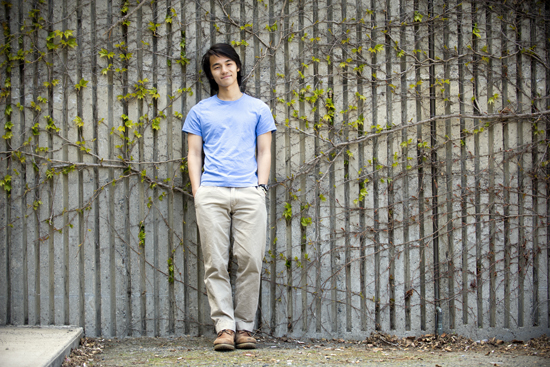How Malaria Changed SAR Student’s Life
Experience helped him discover medicine's human aspect

Jamie Lim’s international medical experiences have helped him see the scientific, political, and personal aspects of health care and to refine his idea of what it means to be a good doctor. Photo by Cydney Scott
As the son of an international banker, Jamie Lim grew up in four different countries. As a human physiology major with an interest in global health, he’s occupied a multitude of worlds.
Lim (SAR’14) spent his second year at Sargent College working in the lab of Susan Kandarian, a SAR professor of health sciences, where he assisted with her research into skeletal muscle wasting. On summer and winter breaks, he’s traveled to the other side of the globe as a mentor and clinician in poverty-stricken villages with acute health care needs. And in his limited spare time, Lim volunteers with Partners In Health (PIH), the Boston-based organization that helps developing countries establish sustainable health care systems.
His interests may seem wide-ranging, but for Lim they’re all linked by his goal of practicing medicine internationally. And while each experience has had its high and low points—treating malaria in Uganda, he caught it himself—they’ve all blended to help him see the scientific, political, and personal aspects of health care and to refine his idea of what it means to be a good doctor.
“I’d learned so much about the biology of malaria, but until I saw people suffering from it and until I got it, I didn’t know how miserable it was,” he says. “It adds a human aspect to medicine.”
Born in Tokyo, and raised in Riyadh, New York, and Singapore, Lim knew global health was his true vocation long before he came to Sargent. “Moving around a lot gave me a really global perspective—it opened my eyes to the fact that not everyone lives the same way that I do,” he says. “I saw poverty in ways that I didn’t really understand before; I saw a huge disparity in health care access and quality.”
At BU, he found research opportunities early: Kandarian invited him to work in her muscle biology lab after being impressed by his work in her freshman Introduction to Health Professions seminar. “I know basic science is not his passion—global health is,” Kandarian says. “I think Jamie said yes to working with me because, in terms of treating infectious and other types of disease, it is very helpful to have treatments that were devised in developed countries. What I think he got a peek at by working in my lab is the kind of work that is necessary for the very beginnings of treating disease.”
When his freshman year was finished, Lim jumped at the opportunity to take a service-learning trip to Tanzania, where he and other volunteers staffed triage clinics at a local elementary school. But after he returned, he felt uneasy about the work: “We were treating people for diseases that would inevitably come back two weeks later,” he says. “It was really frustrating.”
When he traveled to Uganda six months later, he chose to work with a local grassroots group, thinking the work might have a lasting impact. What he got was a far more intense clinical experience. He found himself the only clinician on Kimi, an island in Lake Victoria with a population of 3,500 and an HIV prevalence rate of 37 percent. He saw up to 60 patients a day, most with symptoms he was unable to treat in any meaningful way.
Discouraged, Lim returned to Boston—and found the global health experience he’d been seeking only a few blocks away. He began volunteering with the nonprofit Partners In Health, headquartered less than a mile from Sargent, and immediately found himself working on projects intended to develop sustainable methods to resolve health care disparities, such as helping the oncology team create a patient database for cancer programs in Haiti and Rwanda and serving as an executive assistant on a health care project based in rural Nepal.
Now, with less than two years at Sargent still ahead of him, Lim is further expanding his activities. His PIH stint has piqued an interest in health care politics, so he’s considering a master’s in public health along with an MD. He’s moved on from Kandarian’s lab, but inspired by the potential applications of her research, he’s taking courses in global cancer disparities and outcomes. Undeterred by his bout of malaria, he also plans to travel to Southeast Asia and learn more about the regions where he might practice one day.
“I’m not in medical school yet; I’m not a doctor. There’s only so much I can do,” he says. “So right now I want to gain experience in whatever I can.”
A version of this story was published in the 2012–2013 edition of InsideSARGENT.
Comments & Discussion
Boston University moderates comments to facilitate an informed, substantive, civil conversation. Abusive, profane, self-promotional, misleading, incoherent or off-topic comments will be rejected. Moderators are staffed during regular business hours (EST) and can only accept comments written in English. Statistics or facts must include a citation or a link to the citation.